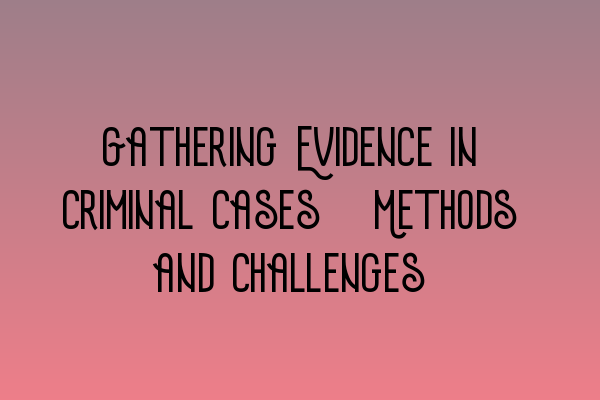Gathering Evidence in Criminal Cases: Methods and Challenges
When it comes to criminal cases, gathering evidence is crucial for establishing the truth and ensuring justice is served. The process of gathering evidence involves various methods and poses its own set of challenges. In this article, we will explore the different methods used and the challenges faced in gathering evidence in criminal cases.
Types of Evidence
In criminal cases, evidence can come in different forms, including:
- Physical evidence: This includes items such as weapons, fingerprints, DNA samples, and other tangible objects that can be used to establish a link between the crime and the perpetrator.
- Testimonial evidence: This refers to statements given by witnesses, victims, or suspects that provide information about the crime or the events leading up to it.
- Documentary evidence: This involves the use of documents, such as contracts, emails, and financial records, to establish certain facts or events related to the case.
- Expert evidence: In some cases, experts in their respective fields may be called upon to provide specialized knowledge or analysis that can help clarify complex scientific or technical aspects of the case.
Each type of evidence has its own significance and requires careful consideration during the investigation and presentation in court.
Methods of Gathering Evidence
Law enforcement agencies and legal professionals employ various methods to gather evidence in criminal cases. Some common methods include:
- Crime scene investigation: Inspecting the crime scene thoroughly to collect physical evidence, document the layout, and look for any clues that may help establish what happened.
- Witness interviews: Interviewing witnesses to obtain their accounts of the incident in question. Witness statements can provide valuable insights and help corroborate or challenge other evidence.
- Surveillance and monitoring: Using surveillance techniques, such as video cameras, phone taps, or undercover operations, to gather evidence of illegal activities or establish the whereabouts of suspects.
- Forensic analysis: Utilizing specialized techniques and tools to analyze physical evidence, such as DNA analysis, fingerprint matching, ballistics testing, and computer forensics.
- Records and database searches: Accessing and reviewing public records, financial records, phone records, and other databases to uncover relevant information or establish connections.
These methods are often used in combination, depending on the nature of the case and the available resources.
Challenges in Gathering Evidence
While gathering evidence is crucial, it also presents several challenges that can impact the outcome of a criminal case. Some common challenges include:
- Lack of cooperation: Witnesses or suspects may choose not to cooperate, making it difficult to obtain statements or information.
- False or unreliable information: People may provide inaccurate or misleading information, intentionally or unintentionally, which can complicate the investigation.
- Legal and ethical considerations: Adhering to legal and ethical guidelines while gathering evidence is paramount to ensure the evidence is admissible in court.
- Resource limitations: Limited resources, such as time, personnel, or technology, may hinder the thorough investigation and gathering of evidence.
- Conflicting evidence: Sometimes, different pieces of evidence may contradict each other, requiring careful analysis and interpretation.
Overcoming these challenges requires a strategic approach, effective communication, and adherence to legal protocols.
As criminal law and practice professionals, we understand the importance of gathering evidence and the challenges that come with it. Whether you are preparing for the SQE 1 or SQE 2 exams or seeking guidance on criminal law and practice, check out our related articles and resources:
- SQE 1 Practice Exam Questions
- SQE 1 Practice Mocks FLK1 FLK2
- SQE 2 Preparation Courses
- SQE 1 Preparation Courses
- SRA SQE Exam Dates
Feel free to explore these resources to enhance your knowledge and understanding.
Gathering evidence in criminal cases is a complex and critical process. By understanding the different types of evidence, employing effective methods, and tackling the challenges head-on, legal professionals can ensure that justice is served and the truth is revealed.
